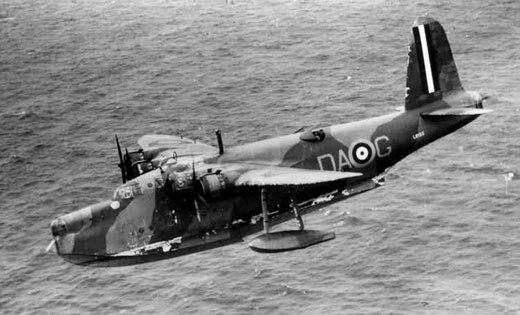Battle of Britain
Day 22
Weather - Warm and fair conditions over the country with mist in the Channel.
Combat - Improved weather brings early raids. Hurricanes of No: 111 Squadron intercept one such raid, of Ju-88's, off Dungeness at about 0700hrs. There are no more combat and raids until the afternoon. One particularly large raid, consisting of Me-110's and Me-109's, approach Dover at about 1600hrs and Spitfires of No: 64 and 74 Squadrons along with Hurricanes of No: 501 Squadron are scrambled to intercept.
Not until during the night do raids increase, with bombs dropping on areas near Swansea and South Wales, the Hornchurch, Gravesend and Shoeburyness areas of Kent; Southend and Brentwood areas of Essex; Ipswich, Wattisham, and Martlesham areas of Suffolk and Croydon. In attacks on convoys during July, 18 small steamers and 4 destroyers have been sunk.
R.A.F. Losses: 6 aircraft damaged or destroyed, 2 pilots killed and 1 wounded.
Luftwaffe Losses: 7 aircraft damaged or destroyed, 7 pilots and aircrew killed or missing and 6 wounded.
NOTE: Losses include non-combat patrols and accidents.
A Short Sunderland |
 |
Battle of the Atlantic
- U-99 sinks the British steamer Jamaica Progress (5475t) and Jersey City (6322t) 40 miles southwest of Barra Head. 7 are lost on the Jamaica Progress with 30 survivors being picked up by the British trawler Newland. 2 cremen are lost on the Jersey City with 43 survivors being picked up by the British steamer Gloucester City.
- The Norwegian steamer Stalheim (1298t) sinks on a mine a half mile west southwest of South Pier, Port Talbot, with the loss of 5 crewmen.
British War Production
Fighter output for July is found to be 50% above the target figures. Since May 1 1200 have been produced. This is more than have been made in Germany and the RAF is therefore closing the Luftwaffe's advantage.
German Raiders
The German armed merchant cruiser Pinguin sinks the British steamer Domingo de Larringa (5358t) in the South Atlantic. 8 of the crew are lost and 30 are made prisoners of war.
[Germany, Planning
Hitler calls a meeting of the top officers of the navy to discuss the situation. Adm Raeder, the Commander-in-Chief, gives a detailed exposition of the difficulties of crossing the Channel with the means at present available to him. In his judgment it would be expedient to postpone Operation Sealion from September 13 to a date between September 19 and 26 to take advantage of favorable tides, and above all to limit the operations to the Straits of Dover. Finally, he comes back to the idea he has often expressed before, that the operation should be postponed until next spring.
Hitler also presents his plans for the invasion of the USSR to the OKH, the German Army High Command, and OKW, Armed Forces High Command. Speaking of increased Soviet strength along the eastern frontier, Hitler believes that Stalin has further territorial ambitions in the Balkans, namely the Romanian oil fields. Hitler then expands by claiming that Stalin's aims are no different from those of Peter the Great two centuries earlier, namely the conquest ot Poland, Bulgaria, Finland and the Dardanelles. War with the USSR is thus inevitable. In addition, he believes that defeating the Soviet Union will further weaken Britain because, with the Soviet Union laid low, Japan will be able to gain hegemony in the Far East. This in turn will focus the United States' attention on the Pacific region to the detriment of Britain. 'If Russia is laid low, then Britain's last hope is wiped out, and German will be master of Europe and the Balkans.'
Accepting that an attack cannot now take place before spring 1941, Hitler states that the army will be expanded to 180 divisions, 120 of whih will be in the East by the spring. Neither von Brauchitsch nor Halder offer any objectives to these plans.
[United States, Home Front
Secretary of War Stimson calls for military conscription in the U.S. He says, 'Today we are face to face with a potential enemy which not only has been conscripting and training its own forces for the past six years but which today is putting conscription into effect upon its victims in Poland and France, and in Norway, Denmark, and Holland, in order that its own war supplies may be more ample.' Privately, Stimson feels that Britain will fall within a month.
[Vichy France
The Vichy government decrees the death penalty for any Frenchman who joins a foreign army.
[